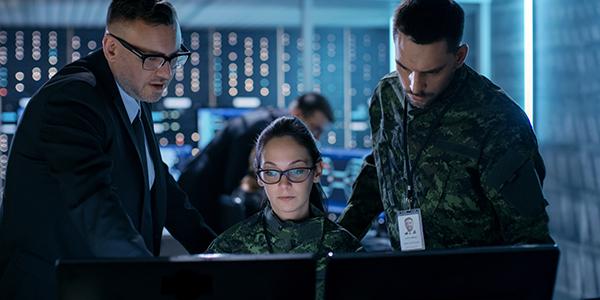'We Cannot Have A Failure to Imagine'
Lt. Gen. Stephen G. Fogarty, USA, commanding general, U.S. Army Cyber Command, is preparing for the command's move from Fort Belvoir, Virginia, to Fort Gordon in Georgia later this year. Top of mind for the general though is not the physical move, it’s the people.
“It’s all about the people,” stressed Gen. Fogarty during his keynote at the third annual Cyber Education, Research and Training Symposium (CERTS) in Augusta, Georgia. “We cannot have a failure to imagine” what the future cyber workforce looks like.
"We cannot have a failure to imagine."-Gen. Fogarty @ARCYBER #CERTS2020
— Julianne Simpson (@simpson_signal) January 15, 2020
“If we fail to imagine than we will lock ourselves in tiny little boxes and get caught up in processes,” said the general.
And if that happens, “we close off opportunities for ourselves.”
Gen. Fogarty has spoken about the “need for speed” before. He was mostly thinking about operations then. He admits that now, though, “We are in a race not just for technology but for talent.”
Lt. Gen. Stephen Fogarty, USA, @ARCYBER opens his keynote by telling the audience we aren't just in a race for technology, but for talent. #CERTS2020
— Julianne Simpson (@simpson_signal) January 15, 2020
That’s part of the reason he is so excited for the move to Fort Gordon in May. The new campus is operationally relevant and is going to enable collaboration from the most important capability in his opinion—the workforce.
“If you’re not collaborating, you are always going to be running after the adversary. You will never have the initiative,” said Gen. Fogarty.
His current workforce is truly operating 24 hours a day, 7 days a week, making a difference globally. And thankfully they’ll get global reach from Georgia, which is critically important, the general said.
There are cyber forces located around the globe and the new campus at Fort Gordon will give Gen. Fogarty the ability to connect to that global enterprise and execute mission command in real time. Without access to everyone, the mission slows down.
He acknowledged the many partners that are the key to this success, including academia, industry, government on all levels, and friends on Capitol Hill who are actively helping get the Cyber Command where it needs to be.
“Things are moving so fast right now that the only thing that can keep up with it is the people … because the workforce out there doesn’t have a failure to imagine. And they understand the environment is changing,” Gen. Fogarty said.
The environment is changing. What we used to talk about with cyber has expanded to information warfare. It’s beyond just cyber, just intel, just signal. -Gen. Fogarty #CERTS2020
— Julianne Simpson (@simpson_signal) January 15, 2020
He argues that what people used to describe as cyber has now expanded to information warfare. “It’s beyond just cyber, beyond just intel, beyond just signal,” he said.
The ability to have people that can recognize what’s going on in that environment and develop viable operations to maneuver in that information environment, not just cyber, requires a special type of person, the general stressed.
Where do we get these people from? “I think we need to start in elementary school. That’s where we are going to have to start building,” Gen. Fogarty said.
Teachers need the tools to excite interest at the earliest possible level, recognize talent and start to identify those bright minds that just need a connection, opportunity, guidance and a sense of purpose to be hugely successful, the general added.
We need to excite interest at the earliest possible level, recognize talent at the earliest possible level and start to identify those bright minds that just need a connection, opportunity, guidance and a sense of purpose. -Gen. Fogarty #CERTS2020
— Julianne Simpson (@simpson_signal) January 15, 2020
He also recognized the importance of civilians who provide maturity, continuity and an alternative for those that want to serve the nation but don’t necessarily want to put on a uniform.
The general said he needs tool developers, interactive online operators and “smart people who have the ability to get after their mission, work well with others, collaborate effectively and don’t have a failure to imagine.”
It’s more than just cyber skills, too. Soft skills such as understanding how people make decisions and the psychology behind social media and marketing are important to this workforce.
“It’s our ability to pull all this together that is going to allow us to meet the requirements for the commanders that we support and give us true capabilities,” said Gen. Fogarty.
“This mission is expanding way beyond what we thought the requirements were going to be 10 years ago, five years ago, even just a year ago. We are trying to evolve and I need your help because you are going to provide that most important resource: the human being,” the general concluded.





Comments